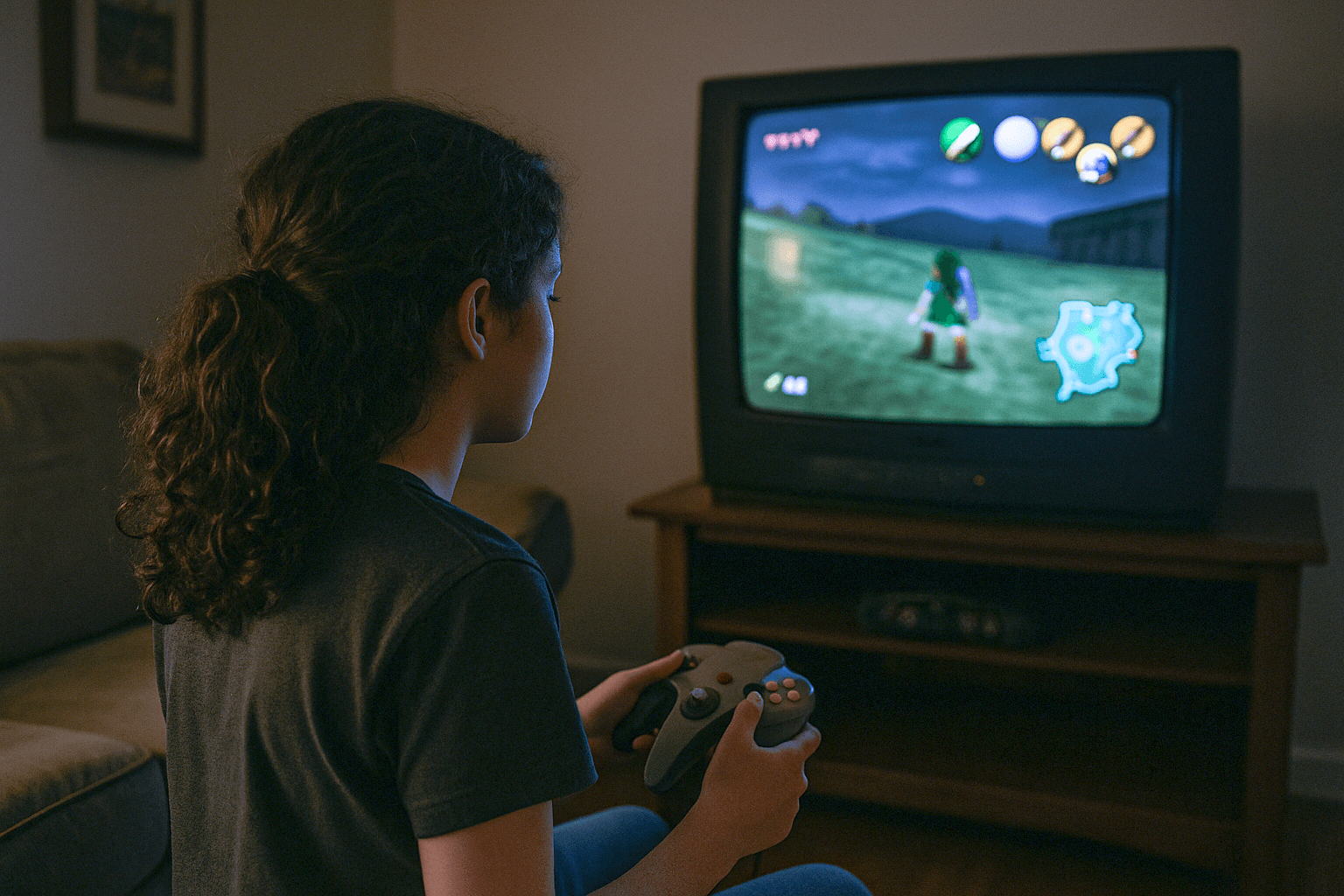
The first time I got in trouble for playing a video game too long was during winter break, 1998.
My younger brother had just received The Legend of Zelda: Ocarina of Time for the Nintendo 64 that Christmas. In case you haven’t heard, Ocarina of Time is a big deal. It earned perfect reviews, won awards, and is considered one of the most influential role-playing games (RPGs) ever made. RPGs usually have long, detailed storylines and can take hundreds of hours to fully complete. This one takes about 100 hours if you’re aiming for perfect completion.
So, in my defense, when my mother worriedly told me I had been playing for six hours straight and needed to stop, I was just getting started. I probably hadn’t even gotten to the Master Sword yet.
Some of you probably just balked at “six hours.” Don’t worry, my mother was much more vigilant about monitoring my game time after that. But that moment leads to the real question of this blog: what do you do when your child seems obsessed with video games?
Watch Out! Too Much Gaming Can Be Harmful
Without question, research has shown that too much screen time, including video games, can negatively affect children’s development. A 2025 meta-analysis by the American Psychological Association reviewed years of studies and found that kids with high screen use tend to get less physical activity, have poorer sleep, and spend less time interacting with family and friends.
You don’t need to read the entire 31-page study to understand what this means for kids. These habits can cause ripple effects: problems with attention, memory, and processing speed; emotional ups and downs like irritability, anxiety, and depression; and a reduced ability to manage stress. Without enough rest and exercise, video games may also negatively impact kids’ immune systems and weight.
Many studies note that middle-school-aged boys, in particular, may be more susceptible to what some call “video game addiction.” But what does that really mean?
Look! Identifying Unhealthy Gaming Behavior
The World Health Organization recognized “Gaming Disorder” in 2018, but video game addiction is not an official diagnosis in the DSM-5 (the main manual professionals use for identifying and treating mental health conditions). That’s partly because researching this is complicated: most of what we know comes from parent reports, and every family has different ideas about how much gaming is “too much.” What one parent sees as a problem, another might view as normal for today’s kids.
To put this in perspective, if we look at the DSM-5’s criteria for alcohol use disorder—which focus on patterns of problematic, addictive behavior—and imagine the manual is describing excessive video game use instead of drinking, the similarities are striking. In other words, if you replace the words ‘alcohol use’ with ‘gaming’ in the DSM’s criteria*, it might read something like this:
- Gaming longer than intended
- Repeatedly trying (and failing) to cut back on gaming
- Spending lots of time earning or negotiating for gaming privileges
- Craving, or a strong desire to play video games
- Gaming that results in failure to complete schoolwork, chores, or work responsibilities.
- Continued video gaming despite having persistent recurrent social or interpersonal problems caused by excessive gaming
- Missing important social or recreational events to play instead
*There are four more DSM-5 criteria, but they deal with the biological effects of alcohol and aren’t relevant to gaming.
If this sounds familiar, you’re not alone. Many families might recognize at least a few of these problem behaviors in their own homes. Which raises the big question: why do some kids regulate their time just fine while others really struggle?
Like substance use disorders, it often comes down to a mix of factors: a child’s biological temperament, their environment, or an underlying mental health condition. Research also shows that gaming activates the brain’s reward system, releasing dopamine. Over time, this system can become desensitized, meaning kids may chase longer or more intense gaming sessions to get the same “feel-good” effect. That’s why some kids will yell at their screens in frustration, and also melt down just as quickly when asked to stop.
You got a heart! The Surprising Benefits of Gaming
It’s important to remember that gaming isn’t all bad. Studies have shown benefits like improved attention, creativity, hand-eye coordination, spatial processing, and problem-solving. RPG’s, even violent ones, have been found to improve information processing.
Other research shows that gaming can reduce cortisol (the body’s stress hormone) after play. There are even games designed for therapeutic purposes. At CCGC, for example, we use Play Attention, a clinically proven program to support children with ADHD.
So the key isn’t whether gaming is “good” or “bad”, like so many things, it’s about finding a healthy balance.
Hey! Listen. Supporting Healthy Gaming
Kids should primarily be engaging in activities that are hands-on, encourage physical activity, and promote healthy connections with friends and trusted adults. But the good news is many games can support these values if you choose wisely. Multiplayer games often require cooperation, resource sharing, problem-solving, and communication. RPGs can help with planning and creativity. And some games are truly works of art that can be appreciated on multiple levels.
Given all of this, how can we support kids while they play?
Here are some practical tips for parents:
- Check content. Use resources like Common Sense Media to confirm games are age-appropriate. Don’t assume another parent did the research, and the game is okay just because friends have it! (For example, my mom once thought Grand Theft Auto: Vice City was “just a driving game.”)
- Set consistent limits. Be consistent with rules and expectations around gaming, especially for kids with behavioral health challenges that have an increased need for routine and predictability.
- Make gaming a choice for designated “screen time,” as opposed to a distinct activity that is available after the use of a tablet or watching TV.
- Keep it around the same time each week, and preferably after school and homework/household expectations have been met.
- Use timers. A visual timer helps kids who struggle with the concept of time know when play will end.
- Tie gaming to responsibilities. For example:
- “Clean your room first, then you can play with the time that’s left.”
- “Great job with homework this week, you’ve earned extra time tonight.”
- “You did well with your sibling yesterday. Tonight, you choose the game, and I’ll play too.”
- Be cautious with online play. For safety, kids should only connect with peers you have met. We could write a whole additional post about this topic, but it's always important to remember: no family is immune to the dangers of kids interacting with strangers on the internet.
- Consider Glenn Beck’s experience, and he has very intense rules for his kids to begin with.
- To help keep kids safe, consider using monitoring apps. Tools like Kidslox or Bark can track gaming, chats, and content.
- Try screen-free days. Designate a weekly or monthly “no screens” day. Start small (maybe allow a family movie but no solo gaming) and it will get easier over time.
- Play together. This is the most important step. By joining your child, you can:
- Model frustration tolerance.
- Coach problem-solving skills.
- Talk through tricky content like you would with a TV show.
- Build memories
Video games can mean a lot of different things to different families, but with games and screens of all kinds being such a central part of all of our daily lives, there’s no reason we can’t celebrate the good that comes out of time spent together in this way. Some of my positive memories about my father are when he played GoldenEye 007 with me and my brothers. He would almost always win—and adults winning because they are more competent and skilled is not a bad lesson for kids to learn. Although...you may find your child has some impressive skills you didn’t even know about!
Final Thoughts (Quest Complete!)
Every child is different, and you know your child best. My family went through some hard things when I was a teenager, and there were probably worse ways to cope than playing a video game for too long—and my mother knew it. And now, as an adult, I’m not ashamed to say that after a stressful day, going home and annihilating a monster or completing a quest helps me relax.
My story is not everyone’s story, though, and if you worry your child has an underlying mental health condition making it harder to manage their video game use, and it’s negatively impacting other areas of life, reach out to a professional who can offer some support.











